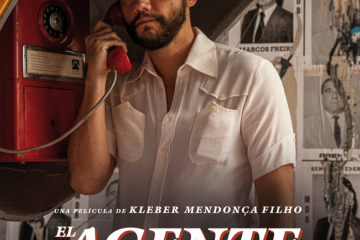Publicado en caracaschronicles
“Venezuela is a complex country, and only complexity can save us”
Alberto Barrera Tyszka
What you notice first is how beautiful the sky is. Mirroring the aquamarine of the Caribbean, it suggests one of those sentimental video about Venezuela in my Facebook feed. Second, of course, and without delay, come the bullets. So many of them. What I first processed as noise I soon realize is really the rattle of the war arsenal from which they banged. AK-47s, M74s, 387s, if it wasn’t for the malandrobling, and again that sky, this could have been filmed in Aleppo.
One particular semi-automatic pistol has this light-blue extra magazine gizmo I must admit I find rather cool. Then there are the Nike shoes, the baseball caps, the fake-gold chains, the trembling of the man filming the video.
Though kitsch, it all exudes defiance. And, though revolting, it impresses.
I may be used to seeing malandro videos, but this one is different. Different in terms of the film and the weaponry, the scale of the cast, and – inevitably – that sky. This barrage of bullets, I later learn, was filmed in broad daylight atop a prison roof. The occasion? A funeral for a Margariteño prison gang-lord.
Although he murdered, extorted, kidnapped and trafficked, he was nonetheless mourned by many (criminal or otherwise) in his island. All in one sentence. They called him El Conejo.
It’s ironic that this man’s passing has become the most eloquent symbol of Venezuela’s decay. Ironic not because our prisoners are better armed than their jailers, but because an obese man obsessed with the Playboy bunny and with a surprising monopoly of violence, single-handedly managed to hold the rule of law up for ransom.
They say truth is stranger than fiction. What they don’t say is it can be more pathetic than tragedy as well.
To see El Conejo’s funeral is to be brought face to face with overwhelming evidence that Venezuela has become a failed state. How did it happen? When? But, more than anything, why?
Octavio Paz, the celebrated Mexican intellectual, certainly could not have foretold the rise of the likes of El Conejo or of narcocorridos for that matter. But he understood more than most about how Latin American states could fail. So that’s where I went for answers.
Paz argued that the tragedy of Latin American modernity – its constant flirtation with failure – rested on the essential hypocrisy of its Independence; lead not by statesmen with a history of democratic exercise but by generals of oligarchic upbringing, hungry for power and not its necessary dismantlement. It sought modernity only half-heartedly, and therefore only half-heartedly was it implemented.
“Replacing monarchs with dictators”, modernism in our continent thus began, in many ways, as farce.
A common characteristic our countries shared in the XIXth century was the absolute predominance of caudillismo. Also in common was the way these caudillos used modernist rhetoric in order to justify the coups that brought them into power. People like Santa Ana in Mexico, Paez and the Monagas brothers in Venezuela, Ramon Castilla in Peru, would continuously bring our countries into civil war in the name of Federalism or Liberalism or whatever was in vogue in Europe at the time. Yet once in power they would show no interest in implementing any of the ideals they fought for when in battle.
This basic ideological hollowness was another trait in common. Mock debates for a mock modernity, the great political questions of XIXth Europe turned up again in Latin America, but only in its battlefields, and for apparently no reason whatsoever. As Guzman Blanco’s father, legendary political machinator Antonio Leocadio Guzman, quipped during the Guerra Federal: “if they had said federalism, then we would have affirmed centralism”.
In reality all these caudillos wanted was the riches to be made in the ever-centralised, monopolised and extractive political institutions our economies were based on since colonial times. So tempting, in fact, was this treasure-chest that these strongmen would often not last long – ending their reign again in violence, being replaced again by another warlord – unless, of course, they managed to centralise more power in their hands. And when this happened – think now of Venezuela’s Gomez or Mexico’s Porfirio Diaz – modernity was reached walking backwards.
Now, from Niall Ferguson’s Civilization, to Acemoğlu and Robinson’s Why Nations Fail, this is something we’ve heard before. Independence for us boiled down to Robert Michels’ Iron Law of Oligarchy: when the prize is rich enough, the vicious circle of oligarchy is almost impossible to stop.
The brilliance of Paz, however, is that he focused less on this doomed institutional talk and more on what he believed was perhaps the greatest crime of this modernist hypocrisy: the sacrifice of a cultural identity at the altar of power.
Independence and Caudillismo
Independence was a violent severance of our historical self-consciousness. The only true battle it won was ultimately the one against our cultural self-respect.
‘We are not yet modern’, it protested embarrassedly, ‘for we are all too full of sin’.
This sin was all that remained from three hundred years of colonial South America in all its vice and glory (The Feast of San Juan Bautista, the cult of the Virgin of Guadalupe, the syncretic philosophy of the Jesuits), which would sooner or later have to be atoned for. The implication, of course, being on the rhetorical: ‘if only we were more like the Americans, or the French, or the Soviet’.
Latin America’s history ought to begin with Independence, our high-school teachers told us, for what had come before was but a chronology of crime and sin best forgotten.
As Paz puts it:
At the onset of the 19th century [Latin America] decided to be what the United States already were, a modern nation. This incursion into modernity required a sacrifice: that of ourselves. It is well known what resulted from this sacrifice: we are not yet modern, but now we are in a quest for ourselves.
The consequence in Latin America of this half-hearted modernism that was also a half-hearted patricide – this, as Paz puts it, ‘suicidal cult of development’ – is a general sense of cultural and historical orphanhood.
Twin tragedies: a power elite using diverse masks of modernity to hide and justify their crimes, helped by revolutions and civil wars that only achieved these superficial changes of attire, and a disenfranchised base with no cultural ideal and no economic prosperity to cling to.
The result: a modernity that only existed for the privileged and that did not trickle down to a surging mass of the amodern. The fancy neighborhoods of the big cities, pride and glory of 20th century modernity, were quickly outrun by the underdevopled and uncivil neighborhoods growing in the margins of these very cities. In this particular, Catia’s overtaking of Caracas’ modernist bloqs of the 23 de Enero is perhaps a prime example.
Indeed, nothing speaks more to Paz’ idea of an orphaned Latin America than the almost unstoppable rise of our countries’ barrios and favelas. Growing literally on the fringes of modernity, not only in terms of their access to the economy and the rule of law, but also in their architecture, music, literature and general sense of themselves, it is by understanding them in this context of an undigested modernity that we may come to an answer to the mystery of El Conejo.
Life on the Fringe.
Our barrios eventually took a cultural life of their own, having, in their fatherlessness, nothing else to adhere to. Yubraskas, Guainers, Yumileidis are striking names especially because they make no reference whatsoever to our native indians –they are simply the fruits of this very orphanhood we’re discussing.
If anything, their reference is to this odd post-industrial world where prans operate ungramatically through whatsapp, ride motorbikes and shoot state-of-the-art weaponry, use the Plaboy bunny of as emblem and name their children Yusnaby in reference to the U.S. Navy vessels skirting our coast. Our cultural inspiration is so fatherless that we have resorted to recycling whatever garbage comes our way, indigesting foreign names and misusing modern items. We are the 2.0 of Noble Savages, as it were.
And in a sense, Venezuelan development in the 20th century was overrun not only in urban terms: just as rapidly as barrios avalanched inwards into our self-serving mirage of development, our Cuarta Republica was overtaken by a new populist tide that made use precisely of this bulging underdevelopment.
The fact that the Cuarta Republica failed to provide a powerful modern identity to this orphaned sector of society allowed new caudillos to arise. Chavismo in this sense is mostly not a populist doctrine of economic retribution, but a desperate cry for cultural identity. The resurgence of an ‘amulatado’ Bolívar makes even more sense under this light.
Now that Chávez is dead, and his effervescent parlocracia has been muted, a big sector of our society is again desperately looking for shelter in our fragmented country. It is in this pursuit that people like El Conejo or Yubraska can become later-day junior caudillos, and where in our desperate quest for a semblance of rational government their pleas of patronage have begun to outshout our own. Indeed, Chavismo having accelerated this trend of underdevelopment, their own orphaned vision of themselves has become the most strident fragment of our national identity.
So it’s not that we are a failed state. For an ever-increasing portion of our society state failure has been the one reliable constant. That is, for a big chunk of our society, modernity never came — or, rather, it came disguised. The only difference now is that, after so many years of orphanhood, we are such a minuscule minority that their tragedy is now engulfing ours.














